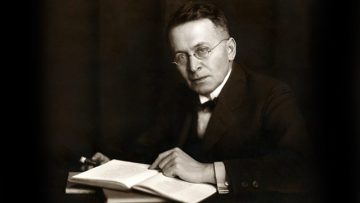 Ted Mann in Tablet:
Ted Mann in Tablet:
Kraus loved paradoxes and published a magazine, Die Fackel, full of them. “An aphorism can never be the whole truth; it is either a half truth or a truth-and-a-half,” he wrote. Kraus also gave popular stage performances, in which he played piano, read Shakespeare’s sonnets, and acted out parts from his monumental masterpiece, the 800-page play, Die letzten Tage der Menschheit, usually translated as The Last Days of Mankind.
The Last Days was conceived as a play in the early weeks of World War I, from the perspective of Vienna, then the capital of the Austro-Hungarian Empire. The play begins with Vienna newsagents crying the headlines, “Archduke Ferdinand assassinated in Sarajevo! Murd-ra’s a Serb!” (“Thank God, not a Jew,” remarks a passerby to his wife, who immediately drags him offstage.) The play ends with the voice of God intoning, as Kaiser Wilhelm did in the aftermath of the war, “This is not what I intended.”
Kraus wrote his play “live” throughout the war in response to events reported or observed. As he says in his introduction, “The most improbable actions reported here really occurred … the most implausible conversations are reported verbatim, as spoken, word for word; the shrillest fantasies direct quotations. Sentences whose insanity is indelibly imprinted on the ear are grown into the music of time.”
Patriot: For example, the civilized language we use, even when speaking of the enemy, who are, after all, the greatest scum on God’s earth.
Subscriber: And above all, unlike them, we are always humane. For example, the editorial in the Presse even talked about the good times ahead for the fish and crustacea in the Adriatic, with so many Italian corpses to feed on …
In part, Kraus seems to have invented the form of a living play in response to the collapse of the Austrian press during wartime. “The truth is that the newspaper is not a statement of contents but the contents themselves; more than that, it is an instigator,” said Kraus in a remarkable speech, “In These Great Times,” made in 1914 as WWI commenced. “It would be far less shameful to be paid for committing atrocities than for fabricating them.”
More here.
